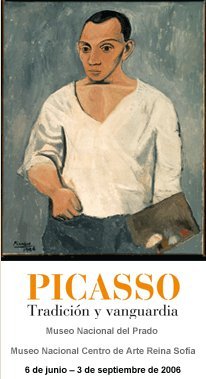Pablo Picasso
dal 5/6/2006 al 2/9/2006
Segnalato da
5/6/2006
Pablo Picasso
Prado Museum, Madrid
The exhibition is a complete retrospective. On this occasion the exhibition brings together some of Picasso's most important paintings from museums and collections around the world, whose generosity has meant that most will be seen in Spain for the first time. Including works such as Three Musicians which has only travelled to Europe twice, the last time almost forty years ago.

Tradition and Avant-garde
Curated by Carmen Gime'nez and Francisco Calvo Serraller
Tradition and Avant-garde, sponsored by Fundacio'n Winterthur and co-produced by the Sociedad Estatal de Conmemoraciones Culturales (SECC), will be a major retrospective of the work of the most important Spanish artist of the 20th century
. The exhibition
. The catalogue
. Pre-booked tickets
. Exhibist List
It comprises a survey of more than 100 masterpieces created over the course Picasso's long and active career, which will be shown divided between the principal galleries of Spain's two leading, national museums. Every stage of Picasso's career will be represented, allowing for an overview of the most important phases within his oeuvre; from the Blue and Pink periods, to Cubism, the return to order in the 1920s, his relations with the Surrealist movement, the difficult years between the Spanish Civil War and World War II, up to the fertile last decades.
The exhibition is a complete retrospective, which, due to the importance of the works included, can be considered of equal importance to other such exhibitions on the artist organised over the past few decades. On this occasion the exhibition brings together some of Picasso's most important paintings from museums and collections around the world, whose generosity has meant that most will be seen in Spain for the first time. Including works such as Three Musicians which has only travelled to Europe twice, the last time almost forty years ago.
The exhibition starts in the Prado, whose Central Gallery will house a group of masterpieces by the artist, flanked by a special selection of works by Spanish Old Masters represented in its collections. Among the paintings that can be seen in this unprecedented dialogue between Picasso and the past are La Vie (1903) Cleveland Museum of Art; Boy with Horse (1906) Museum of Modern Art, New York; Bread and Fruit Dish with Fruit on a Table (1908-1909) and The Aficionado (1912) from the Kunstmuseum, Basel; Self-portrait with Palette (1906), and Three Musicians (1921) from the Philadelphia Museum of Art; The Pan Pipes (1923) from the Muse'e Picasso, Paris; L'Aubade (1942), Centre Georges Pompidou, Paris; and Las Meninas (1656), Museu Picasso, Barcelona.
In the Reina Sofi'a the exhibition takes on a monographic character focused around the Guernica and its legacy, now seen alongside other works of significance for Picasso's artistic response to the dramatic circumstances of modern warfare, such as The Charnel House (1945), Museum of Modern Art, New York, and Massacre in Korea (1951), Muse'e Picasso, Paris. Within this exceptional context, the Reina Sofi'a will also be showing another masterpiece that expresses a condemnation of violence: Goya's 3rd of May 1808 in Madrid. The Executions on Pri'ncipe Pi'o from the Museo del Prado. Seen alongside the Guernica, it will offer a unique image of the disasters of war.
The exhibition, curated by Carmen Gime'nez and Francisco Calvo Serraller, has an Honorary Committee under the esteemed patronage of Their Majesties the King and Queen of Spain and whose president is the Spanish Prime Minister. Other members of this committee are the Minister of Culture, the heirs of the artist and representatives of the leading national and international institutions which house works by the artist.
The exhibition is also organised in collaboration with the Fundacio'n Amigos del Museo del Prado and the Asociacio'n de Amigos del Museo Nacional Centro de Arte Reina Sofi'a, apart from the co-production by the State Society for Cultural Commemorations and Winterthur's sponsorship.
Opening: 6 June 2006
Prado Museum
Paseo del Prado s/n - Madrid
Hours: From 9am to 8pm: Tuesdays to Sundays and public holidays



